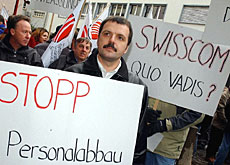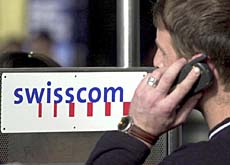Swisscom to cut 1,050 jobs

Switzerland's leading telecommunications operator, Swisscom, is to cut 1,050 jobs in 2003 in an effort to remain competitive.
Trade unions have condemned the job losses, which are part of a wider cost-cutting programme that was decided in 2000.
Swisscom announced on Monday that a further 600 jobs were to be shed – four per cent of the workforce – on top of the 450 already planned for this year.
The company said in a statement that the job losses were due to the economic slump and sustained pressure on prices on the telecommunications market.
“Swisscom has to cut costs on several levels due to the competition that we are facing and due to regulations that we have to lose some market share,” Swisscom spokeswoman Pia Colombo told swissinfo.
Zurich Cantonal Bank telecoms analyst, Serge Rotzer, said the cuts were an inevitable part of the private company’s drive to increase margins and cut costs.
“Since 1998, Swisscom has been a private company and so they’ve had to optimise their profits. In order to do this they’ve had to scale back their size and cut costs… by reducing staff,” Rotzer told swissinfo.
Swisscom added that its customer services division would bear the brunt of the cuts, with a total of 500 jobs going by 2004.
The company also announced that it was intending to reduce its share in the fixed line sector and would shed around 200 jobs in the “Fixnet” division.
The mobile division, by contrast, is a growth area for Swisscom and has created around 700 jobs over the last three years. Although about 75 per cent of Swiss people own a mobile phone, Rotzer said the sector was far from being saturated.
“Swisscom mobile is growing by about five per cent,” Rotzer commented.
Redundancy plan
The job cuts come as part of a redundancy plan that was announced in March 2000, signalling about 3,000 job cuts by 2003.
By the end of last year, Swisscom had already reduced its workforce by 4,000. The company currently employs a total of 17,300 people.
Swisscom confirmed that everyone affected would benefit from a redundancy programme – a plan that has been negotiated with the company’s social partners.
Under the plan, employees made redundant would receive one year of intensive training for a new career challenge during which time, the company said, they would continue to receive their salaries.
Swisscom admitted that the SFr2 billion social programme for fired staff had, in the short term, cancelled out any savings the company had hoped to make through redundancies.
“It is a lot of money that Swisscom has invested [over the last four years]… but cutting jobs is a long-term measure to bring the firm back to profitability,” Colombo said.
Union anger
Trade unions representing workers in the communications industry reacted with anger to the announcement.
Around one thousand people took part in demonstrations in Bern, Zurich, Geneva and Bellinzona protesting against the decision.
The communications and Transfair unions urged Swisscom to draw up new working arrangements, including a shorter working day, as an alternative to the job cuts.
Christian Levrat, the president of the communications union, said unions were shocked at the scale of the cutbacks and the speed with which they were being implemented.
Despite a souring of the telecoms market as a whole, analyst Rotzer maintains that Swisscom’s future is relatively bright.
“Swisscom does not have much growth potential at the moment,” he said. “But if you look at the telecoms market which has stagnated, and as we expect growth in the equity markets after the second half of 2003, then Swisscom is a good stock option.”
swissinfo with agencies
Swisscom is to cut 1,050 jobs.
The job losses are part of a wider cost-cutting programme.
Customer services will bear the brunt of the job cuts.

In compliance with the JTI standards
More: SWI swissinfo.ch certified by the Journalism Trust Initiative











You can find an overview of ongoing debates with our journalists here . Please join us!
If you want to start a conversation about a topic raised in this article or want to report factual errors, email us at english@swissinfo.ch.